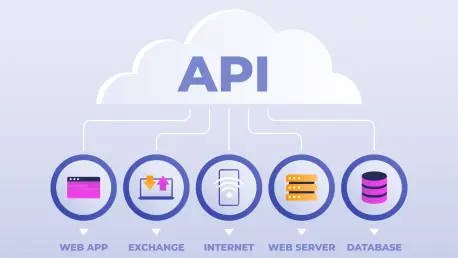The digital age increasingly relies on Application Programming Interfaces (APIs), forming the backbone of numerous online services and platforms. Despite their critical role, vulnerabilities in API security present significant risks, especially in the Asia-Pacific region where an overwhelming 85% of organizations reported security incidents in the past year. These incidents have averaged a financial impact of over $580,000 per enterprise, signaling an urgent need for more effective security measures. The disparity between growing awareness and actual practice further highlights the ongoing struggle to appropriately integrate API security within broader cybersecurity strategies.
Current State of API Security in Asia-Pacific
Internal Communication Gaps
In China, despite being at the forefront of prioritizing API security, there is a notable disconnect between executive perceptions and the on-ground realities faced by security staff. This communication gap can lead to mismatched priorities, where the focus may not align with actual security needs. Such misalignments can inadvertently allow vulnerabilities to persist unnoticed, potentially leading to severe breaches. Bridging this communication gap is crucial for fostering a shared understanding and concerted effort towards effective API security practices.
In India, the situation is complicated further by a stark disconnect between the claims of C-suite leaders and the on-the-ground awareness of AppSec professionals regarding API inventory management. Executives may assert that strong systems are in place, yet security professionals express doubts about the accuracy and completeness of API inventories. This highlights a crucial oversight in the management of sensitive data and emphasizes the importance of accurate and up-to-date inventories to mitigate the chances of potential data breaches. Such discrepancies can lead to significant vulnerabilities if not addressed effectively.
Varying Responses Across Regions
Japan presents a unique situation where, despite heightened exposure to industry-specific API risks, the country has deprioritized safeguarding measures. This deprioritization comes amidst concerns regarding the potential reputational damage that could arise from security failures. A lack of prompt response to API threats might be attributed to other pressing priorities within businesses, potentially placing them at a disadvantage in preempting security lapses. The reputational risks associated with data breaches could erode trust among consumers and partners, emphasizing the need for Japan to reassess its API security stance.
Contrastingly, Australia faces the highest rate of API incidents, yet exhibits slow response times and minimal proactive engagement in testing API vulnerabilities. Persistent threats require a robust and swift action plan, but Australia’s current approach remains understated. The lag in response highlights potential complacency or resource constraints, suggesting a gap in prioritizing API-related risks despite clear evidence of necessity. Addressing these issues calls for an intensified focus on regular testing and immediate response strategies to safeguard their critical digital ecosystems.
Recommendations for Strengthening API Security
Enhancing Communication and Collaboration
The pressing need for a unified approach across Asia-Pacific underscores the importance of addressing internal communication gaps within organizations. A shared understanding of API ecosystems between executives and security teams can foster more cohesive strategies. Aligning priorities through regular dialogue and collaborative efforts is essential to accurately assess and respond to security threats. By fostering an internal culture that prioritizes open communication, organizations can begin dismantling the current security silos that hinder effective risk management.
Moreover, enhancing collaboration across borders within the region could prove beneficial. Sharing insights, methodologies, and best practices regarding API security can help create a cohesive strategy to combat emerging threats collectively. Regional cooperation can elevate the standard of cybersecurity measures, ensuring a broader, collective defense against API-related risks. This strategic partnership may also facilitate a more effective dissemination of knowledge and skills needed to tackle complex issues in the API security landscape.
Implementing Comprehensive Testing and Assessment
Regularly implementing comprehensive API security testing is another critical step towards mitigating potential threats. Consistent assessments of API infrastructures enable organizations to identify and rectify vulnerabilities before they can be exploited. Conducting these tests during both development and runtime phases establishes a proactive defense approach that anticipates rather than merely reacts to security incidents. Continuous evaluation through vulnerability assessments and penetration testing can pinpoint weak spots and safeguard against exploitative breaches.
Also, promoting a holistic strategy that integrates API security into overall cybersecurity frameworks is vital. A unified roadmap should encompass all phases from development to deployment, considering potential risks at every stage. Emphasizing security measures as part of business objectives ensures that protective mechanisms evolve alongside technological advancements. API-related security should be seen not as a separate endeavor but as a foundational element of technological infrastructure that guards against the multifaceted threats it faces.
Road Ahead for Asia-Pacific
In today’s digital landscape, Application Programming Interfaces (APIs) are crucial, serving as the foundation for a myriad of online platforms and services. Despite their significance, the security vulnerabilities associated with APIs pose serious threats, particularly in the Asia-Pacific region. Alarmingly, 85% of organizations in this area have faced security incidents over the past year. These breaches have led to financial repercussions, averaging a hefty sum of over $580,000 per company. This dire situation underscores the pressing need for robust security protocols to safeguard APIs. Furthermore, there’s a notable gap between the heightened awareness around API security and the implementation of effective protective practices. Many enterprises are struggling to adequately incorporate API security into their overarching cybersecurity strategies. Addressing this gap is imperative for organizations to fortify their defenses and mitigate the risks associated with API-related security breaches.









